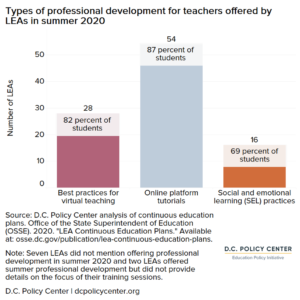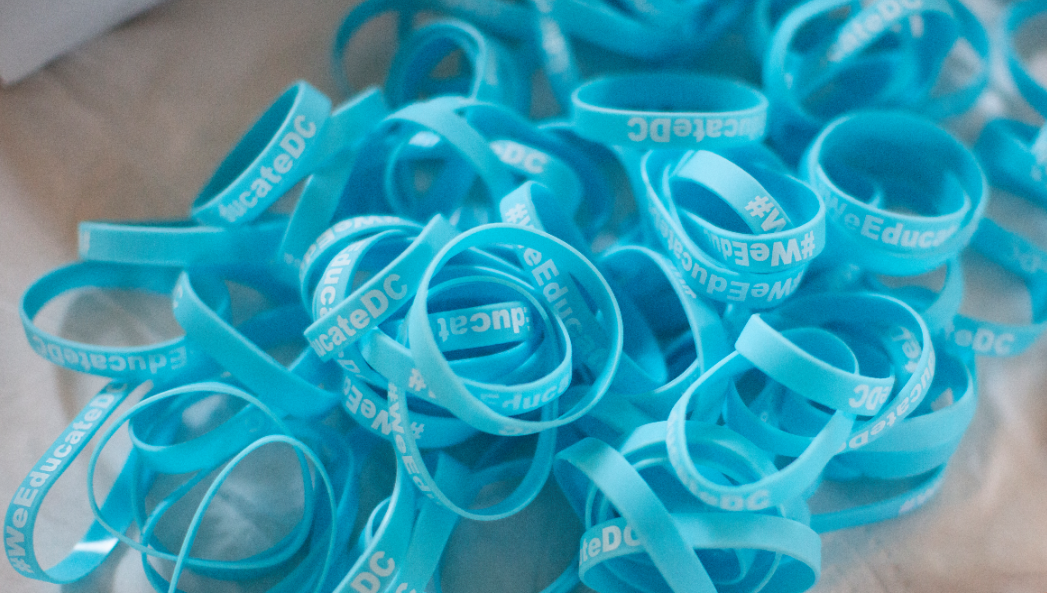In focus groups conducted by the D.C. Policy Center in August 2020, some teachers reported that when D.C.’s public and public charter schools transitioned to distance learning in March, they didn’t have the tools they needed to design and deliver virtual lesson plans. They didn’t know how to best engage students in a virtual environment and were unfamiliar with the online platforms their schools were using. Some also felt unprepared to support their students’ emotional well-being in a virtual setting.[i]
A review of the Continuous Education and School Recovery Plans submitted by each Local Education Agency (LEA) for the 2020-21 school year[ii] shows that in summer 2020, many LEAs provided professional development targeting these concerns. Most commonly, LEAs used summer professional development opportunities to share best practices for virtual teaching (impacting 82 percent of students), provide online platform tutorials (impacting 87 percent of students), and train teachers on how to build relationships with students in a virtual environment (impacting 69 percent of students).[iii] D.C. Public Schools (DCPS), D.C.’s largest LEA, offered all three types of training. More specific topics for summer professional development included understanding how staff will be evaluated, tracking student engagement, and re-examining the curriculum.


These training sessions helped a majority of teachers feel prepared to tackle virtual instruction. In a survey of D.C.’s public school teachers conducted in January 2021, more than half of all teachers (56.2 percent) reported receiving the professional development they needed to teach remotely and (59.5 percent) to support their student’s social and emotional needs.[iv]
As public and public charter schools in D.C. prepare to return to full-time in-person instruction this fall, they will have to provide guidance to teachers on how to meet a wider range of student needs. Over the last year, D.C.’s students experienced a high degree of variability in academic achievement and emotional well-being. Some students were able to remain engaged in class while others found that the pandemic exacerbated preexisting barriers to learning. For instance, when distance learning began in March 2020, some students from low-income households lacked access to technology, preventing them from participating in class. Students with disabilities and English learners also struggled throughout the year to access necessary services and communicate with service providers. Additionally, some students experienced bereavement and economic hardships that impacted their mental health. For example, Black and Latino students saw their families account for a disproportionate share of COVID-19 cases and deaths and watched their families experience the greatest economic losses in the District. Many students also suffered from some degree of social isolation and loneliness that impacted their emotional well-being.[v]
After a tumultuous year, student needs in the fall of 2021 will vary greatly, and to better serve all students, schools will need to increase their investment in professional development for teachers.[vi] Well-designed professional development has been shown to improve student learning and achievement.[vii] Training teachers to manage grief has benefits as well: trauma-informed teaching practices can boost student success, decrease disruptive behavior, and reduce emotional distress in the long term.[viii] Professional supports for teachers such as mentorship, teacher induction programs, and training sessions are also linked to teacher retention and play a role in expanding the knowledge base of the teaching workforce.[ix]
To learn about what kind of professional development schools should offer to prepare teachers for school year 2021-22, the D.C. Policy Center reached out to teachers and professional development providers to ask the following question: what kind of training would be most helpful for teachers to receive this summer?
Rosalyn Lake, SEED Public Charter School, Teacher
I believe that not only do teachers need training but the entire school system as we know it needs change.
This school year was very hard for many of us. Education was hit so so so hard. I believe that not only do teachers need training but the entire school system as we know it needs change, fast. Leaders, Board Members, and Teachers all need to be trained. Below are few areas I think we should focus on as we think about how to prepare for school year 2021-22:
- Virtual professional presentation – to ensure there is a level of professionalism displayed even in virtual professional development spaces.
- Relationship building through hybrid education – to ensure we have tools to build community with our students, their families, staff, etc. that exemplify what appropriate relationships look like in virtual spaces.
- Community partnerships – to ensure we are best serving the communities we actually interact with. We cannot be scared of the communities we serve.
- Digital and global citizenship inside and outside the classroom – to ensure students are up to speed in the global movement of education through technological connections.
- Social and emotional education inside and outside of the classroom – to ensure students and families communicate with each other in restorative ways with consistency.
- Family engagement – to ensure teachers have quarterly dinners with parents to build trust and relationships after a year of disconnectedness.
- Cultural and community exposure through project-based learning
- Cultural inclusion – to ensure that teachers learn their students’ cultural backgrounds so they are able to include some kind of celebration or exposure of the scholars’ culture within the curriculum.
Raymond A. Mullings, Capital Village Public Charter School, 5th and 6th grade Founding Humanities Teacher
Educators will benefit most from professional development centered on socio-emotional wellbeing for ourselves and on how to process grief and trauma with students. We also need instructional support while teaching to address learning loss, especially given the incredible inequities in technology and resources that were exacerbated during distance learning.
On March 13, 2020, many educators in the District, including myself, packed up their materials and headed home for what would be the last time in over a year. The months that ensued could not have been predicted by anyone. The nation fell captive to a rapidly spreading virus that claimed lives at an alarming rate due to the government’s lack of a timely and adequate response. We saw the Black Lives Matter movement surge as millions of Americans took to the streets to protest the gruesomely unjust and untimely deaths of several Black Americans. We observed and participated in one of the most controversial elections of our lived experience. And still, educators across America showed up day after day to fulfill our roles as teachers of the next generation.
Heading into school year 2021-22, teachers need time to process and heal. Many are leaving the profession feeling an incredible sense of defeat. Others are reeling from the anxieties of the world reopening and the subtle, yet urgent push for society to resume normalcy. But we need to remember that we have experienced collective trauma. Educators, more in this moment than ever, need collective healing. Educators will benefit most from professional development centered on socio-emotional wellbeing for ourselves and on how to process grief and trauma with students. We also need instructional support while teaching to address learning loss, especially given the incredible inequities in technology and resources that were exacerbated during distance learning. Teachers need strong and rigorous coaching to support each other and our students this year.
Teachers are not robots. We have lives, emotions, and traumas. Yet, we are treated as disposable pawns with many schools across America making decisions to reopen without considering those working on the front lines with children. Now is the time for us to listen to teachers. We know what support we need to do our jobs effectively: we need professional development that sees us for both who we are as people, and how we perform as educators.
David Ayala, School Leader Lab, Senior Director of Programs
…teachers have been on the front lines since March 2020. They’ve spent the last year developing best practices that other teachers and the community at large might benefit from.
When we talk about the year ahead in schools, a key question is often around the types of training that teachers may need. We would turn this question around: what can we learn from our teachers about ways to best serve their continued growth? In the last year, the education sector has experienced incredible and unprecedented disruption. As we prepare to welcome students back to school and ensure we are ready to respond to the stress that has disproportionately impacted our most marginalized students (Black, brown, at-risk, students with special needs), we must keep in mind that teachers have been on the front lines since March 2020. They’ve spent the last year developing best practices that other teachers and the community at large might benefit from.
Teachers have been laser focused on online learning, hybrid schedules, compacted curriculum, and keeping students connected with school. They hold incredibly important wisdom and perspective on the support they need in order to open doors for kids in the fall. The system has a responsibility to learn directly from the people that have been closest to our students. By asking teachers about the kind of training they want and need, we can do better than “back to normal.” Our teachers are full of expertise. Our schools and systems will be well served to learn everything we can from their incredible efforts prior to and since March 2020.
Read more about the impact of COVID-19 in the District of Columbia.
Feature photo by DC Public Charter School Board (Source)
Tanaz Meghjani is an Education Analyst at the D.C. Policy Center.
Notes
[i] D.C. Policy Center. 2021. “State of D.C. Schools, 2019-20.” Available at: https://www.dcpolicycenter.org/publications/state-of-dc-schools-19-20/
[ii] OSSE required all LEAs in the District of Columbia that serve students in grades K-12 to submit continuous education plans in order to waive the requirement that a school year include a minimum of 180 instructional days at six hours per day. The plans are also intended to provide the public with information on how each LEA prepared for the 2020-21 school year.
[iii] Office of the State Superintendent of Education (OSSE). 2020. “LEA Continuous Education Plans.” Available at: https://osse.dc.gov/publication/lea-continuous-education-plans
[iv] Members of the D.C. State Board of Education. 2021. “Results from the 2021 D.C. All-Teacher Survey.” District of Columbia State Board of Education. Available at: https://sboe.dc.gov/sites/default/files/dc/sites/sboe/publication/attachments/2021-03-17-FINAL-DC%20State%20Board%20All-Teacher%20Survey%20Report%20%28March%202021%29.pdf
[v] Coffin, C. and Meghjani, T. 2021. “Challenges outside of school for D.C.’s students and families during the pandemic.” D.C. Policy Center. Available at: https://www.dcpolicycenter.org/publications/families-during-pandemic/
[vi] Stein, P. 2021. “D.C. schools announce spending plan for academic intervention targeting students who have fallen behind during pandemic.” The Washington Post. Available at: https://www.washingtonpost.com/local/education/dc-students-tutoring-help/2021/02/18/c5061df2-71f7-11eb-b8a9-b9467510f0fe_story.html
[vii] Vega, V. 2015. “Teacher Development Research Review: Keys to Educator Success.” Edutopia. Available at: https://www.edutopia.org/teacher-development-research-keys-success
[viii] Shevrin Venet, A. 2018. “The How and Why of Trauma-Informed Teaching.” Edutopia. Available at: https://www.edutopia.org/article/how-and-why-trauma-informed-teaching
[ix] Garcia, E. and Weiss, E. 2019. “The role of early career supports, continuous professional development, and learning communities in the teacher shortage.” Economic Policy Institute. Available at: https://www.epi.org/publication/teacher-shortage-professional-development-and-learning-communities/
